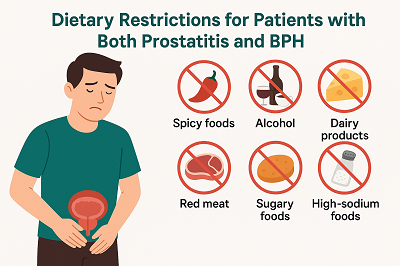Dietary Restrictions for Patients with Both Prostatitis and BPH: What to Avoid for Better Prostate Health
Living with chronic prostatitis is hard enough—but when it's combined with benign prostatic hyperplasia (BPH), managing the condition becomes even more challenging. These two common prostate issues often coexist, compounding urinary symptoms, pelvic discomfort, and overall inflammation.

While medical treatment is crucial, dietary management plays an equally important role in symptom control and quality of life. In this article, we'll explore the key dietary restrictions for patients suffering from both prostatitis and BPH, and why avoiding certain foods can make a significant difference.
1. Avoid Spicy Foods: Triggers for Inflammation
Spicy foods like hot peppers, chili oil, and wasabi can irritate the bladder and prostate, leading to worsened urinary frequency, urgency, and burning sensations. Capsaicin, the active compound in chili, may increase nerve sensitivity in the pelvic region.
Recommendation: Stick to milder herbs and spices like turmeric, ginger, and garlic, which offer anti-inflammatory benefits without irritating effects.
2. Say No to Alcohol and Caffeine
Both alcohol and caffeine are diuretics, meaning they increase urine output. While that might sound beneficial, it actually worsens urgency and nighttime urination (nocturia)—a major problem in BPH and prostatitis patients.
Moreover, alcohol can lower immune response and delay tissue healing, while caffeine may increase pelvic muscle tension and bladder spasms.
Instead: Drink water or caffeine-free herbal teas like chamomile, which can soothe inflammation.
3. Reduce Red Meat and Processed Meats
Diets high in red meat, bacon, sausages, and cured meats are linked to higher prostate inflammation. These foods often contain high levels of saturated fat and harmful preservatives like nitrates.
In patients with BPH, a high-fat diet may contribute to hormonal imbalances, which exacerbate prostate enlargement.
Healthier options: Lean poultry, fish (especially omega-3-rich types like salmon), and plant-based proteins such as tofu and beans (in moderation).
4. Limit Dairy Products
Excessive dairy consumption—especially full-fat milk, cheese, and cream—has been associated with increased risk of prostate inflammation and may elevate certain hormone levels that worsen BPH.
For men already dealing with urinary problems, dairy may further irritate the bladder lining.
Try this: Choose plant-based alternatives like almond or oat milk, or consume low-fat dairy in small amounts.
5. Cut Down on Sugary and Fried Foods
High sugar intake promotes chronic low-grade inflammation, affects insulin sensitivity, and contributes to metabolic syndrome, all of which negatively impact prostate health.
Fried foods and trans fats increase oxidative stress and slow down healing processes in inflamed tissues.
Smart swaps: Whole grains, fresh fruits (like blueberries and pomegranates), and baked rather than fried meals.
6. Be Wary of Sodium-Rich Foods
Excess salt contributes to fluid retention and can increase blood pressure, potentially affecting prostate blood flow and exacerbating lower urinary tract symptoms (LUTS).
Avoid: Instant noodles, canned soups, soy sauce-heavy dishes, and packaged snacks.
Use herbs and natural flavorings to enhance taste without overloading on salt.
7. Moderate Soy and Bean Products
While soy and legumes contain plant-based estrogens (phytoestrogens), which might be beneficial in moderation, overconsumption can disrupt hormonal balance in men with existing prostate enlargement.
Keep intake moderate—a few servings per week is generally safe.
Herbal Treatment Option: A Holistic Approach with TCM
In addition to a carefully managed diet, many patients with prostatitis and BPH have turned to traditional Chinese medicine (TCM) for relief—especially when conventional treatments bring limited results or unwanted side effects.
The Diuretic and Anti-inflammatory Pill, a TCM-based herbal formula, is designed to:
- Relieve inflammation in the prostate and urinary tract
- Improve urinary flow and reduce retention
- Eliminate pain and swelling associated with chronic prostatitis
- Help regulate hormonal balance to slow prostate enlargement
Its natural ingredients promote blood circulation, remove toxins, and support long-term prostate health without antibiotics or surgery.
Final Thoughts
When it comes to managing prostatitis with coexisting BPH, dietary discipline is essential. While no food can cure these conditions outright, avoiding the wrong foods can significantly reduce symptoms and improve quality of life.
Combined with holistic treatments like the Diuretic and Anti-inflammatory Pill, a well-planned diet can empower men to take control of their prostate health—naturally and effectively.
If you're looking for a natural, long-term solution to prostatitis and BPH, explore how the Diuretic and Anti-inflammatory Pill can support your recovery journey. Visit our product page to learn more.



